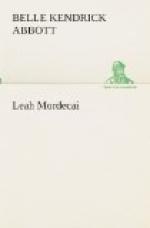Here the beautiful girl ceased her story. Both friends for a time were silent. In Lizzie’s soft blue eyes the tears glistened, and she looked with surprise into the cold, hard face of Leah, which had lost its gentle expression, and seemed petrified by this recital of her woes. Then she said:
“Would I could help you, Leah, by sharing your sorrow.”
“No mortal being can help me, Lizzie. I am ill-starred and ill-fated, I fear.”
Filled with sympathy, and with a heavy heart, Lizzie bent her head, and laid it in Leah’s lap; and her silent prayer, though unheard by mortal ear, ascended to the throne of the Eternal Father, and was answered in the far-off future.
“It’s late, and we must go,” said Leah; “already the street lamps are being lighted, and I shall have to render some good excuse for being out so late.”
“So we must; it is growing late,” Lizzie replied.
“Remember now, I trust you, Lizzie,” said Leah.
“Never fear; I shall never betray your confidence.”
Then the two girls left the window, walked hastily through the hall and corridor, down the spiral staircase, out into the street, and turned homeward.
CHAPTER VII.
The two friends walked side by side in silence the distance of a square, and then their paths divided.
As Lizzie Heartwell turned the corner that separated her from her companion, she drew her shawl more closely around her benumbed form and quickened the steps that were hurrying her onward to her uncle’s home. Her mind was filled with sad and gloomy thoughts—thoughts of the life and character of her beloved friend. The misty twilight seemed deepened by the tears that bedimmed her vision, as she thought again and again of the life blighted by sorrow, and the character warped by treachery and deceit.
“Alas!” thought she, “had the forming hand of love but moulded that young life, how perfect would have been its symmetry! What a fountain of joy might now be welling in that heart’s desert waste, where scarcely a rill of affection is flowing.”
Filled with these and like thoughts, Lizzie reached the doorway of her uncle’s house, and was soon admitted beneath its hospitable roof.
Leah Mordecai, when separated from Lizzie, plodded straight forward toward her father’s elegant home. The street lamps shone brightly, but the departing daylight, that was spreading its gloom over the world, was not half so dark and desolate as her poor heart. Yet Leah seldom wept—her tears did not start, like watchful sentinels, at every approach of pain or joy. Only when the shrivelled fountain of her heart was deeply stirred, did this fair creature weep. Calm, placid, and beautiful in the lamp-light, the features of her young face betrayed no emotion, as she passed one and another, on beyond the din of the garrulous multitude.
At last she stood before her father’s gate, and rang the bell.




